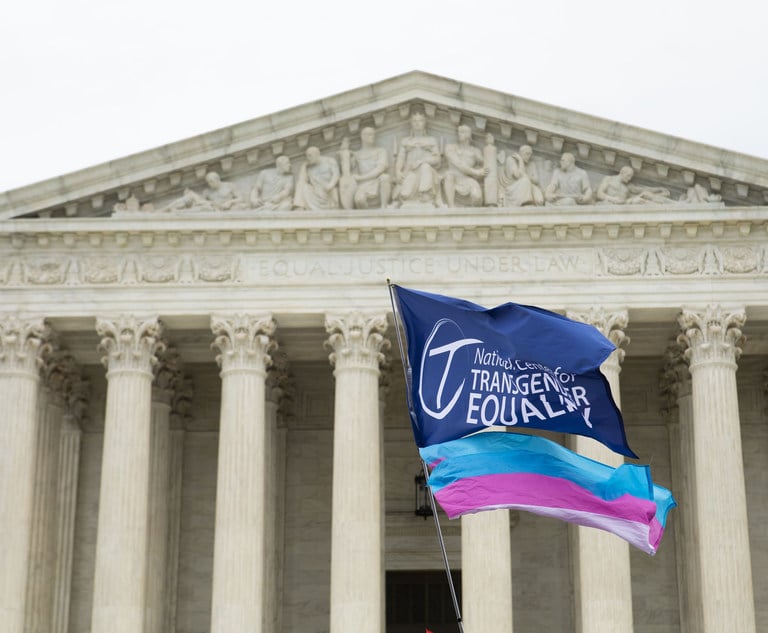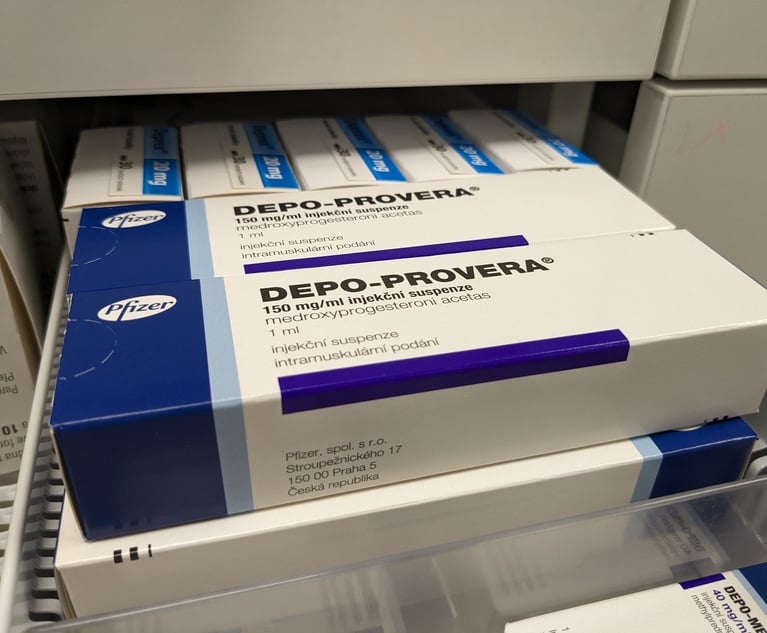 Photo: Shutterstock
Photo: ShutterstockParalegal's Pay Suit, a Cautionary Tale for Feisty Legal Employers
In a fight over $4,250 in penalties won by a former paralegal, a Northern California plaintiffs firm this week lost an appeal that faces the firm with a potential six-figure bill to cover the former employee's attorneys fees.
August 02, 2018 at 09:41 PM
4 minute read
SAN FRANCISCO—In a fight over $4,250 in penalties won by a former paralegal, a Northern California plaintiffs firm this week lost an appeal that has it facing a potential six-figure bill to cover the former employee's attorneys fees.
The First District Court of Appeal on Wednesday actually trimmed the so-called waiting penalty that Danko Meredith P.C. owes former paralegal Taryn Nishiki by $2,000 to $2,250. However, the appellate court upheld an $86,160 in attorney fees award granted to Nishiki by the trial court and ordered the firm to pay her appellate costs and fees.
San Francisco Superior Judge Ethan Schulman, sitting pro tem on the First District, wrote that the firm had “only itself to blame” for running up attorneys fees in a case where it suffered “only a relatively modest loss.”
Nishiki's lawyer, David Lyon of San Francisco, declined to comment Thursday, citing the possibility of a further defense appeal to the California Supreme Court.
The firm's lawyer, Gary Simms of Davis, said that he and his clients were reviewing the decision and considering such a further appeal—especially on issues concerning the attorneys fees award.
The underlying case has its roots in Nishiki's departure from Danko Meredith in 2014. Nishiki resigned via an email to the firm's two partners, Mike Danko and Kristine Meredith, on Nov. 14, 2014. In her email she noted that her unpaid vacation needed to be paid within 72 hours of her notice of resignation.
As noted in Wednesday's opinion: “When an employee resigns without notice, California law requires the employer to pay all wages within 72 hours. If the employer willfully fails to do so, the employee's wages continue as a penalty from that due date until the wages are paid, for up to 30 days.”
When Nishiki resigned, she was owed $2,880.31 for unused vacation time. The firm mailed her a handwritten check within the allocated time. Although the check, signed by Meredith, had the correct number in the numeral box, she had written an amount $80 less on the line below. Nishiki informed the firm that her bank refused to accept the check but wasn't issued a corrected check until Dec. 5.
Nishiki filed a complaint with the California Labor Commissioner after her departure, seeking unpaid vacation wages; $23,718.75 in rest period premiums; and waiting time penalties for the delay in receiving the $2,880.31 check totaling $7,500, or $250 per day for 30 days. The hearing officer with the state sided with the firm on the first two claims but found that Nishiki was due waiting penalties for 17 days—Nov. 18 through Dec. 5—and awarded her $4,250.
The firm appealed Nishiki's award to the Alameda County Superior Court, where Judge Joseph Bergeron upheld the $4,250 award and awarded Nishiki her attorneys fees.
On appeal, the firm argued that the trial court should not have awarded Nishiki all of her attorneys fees since two of her claims failed. But the First District on Wednesday held that the applicable fee-shifting provision in Nishiki's case was “a one-way provision allowing attorney fees only against a party who appeals an administrative award, in order to discourage such trial court actions.”
“Moreover, it warrants emphasis that it was defendant, not Nishiki, that chose to appeal and seek a trial de novo after suffering only a relatively modest loss before the commissioner, having defeated two other claims for which Nishiki sought considerably higher damages,” Schulman wrote “If Nishiki consequently was required to incur substantial attorney fees to retry the entire case, including issues on which she did not prevail before the commissioner, defendant has only itself to blame.”
Simms, the firm's lawyer, said Thursday the notion that employees can get their full attorneys fees paid even on claims that fail could give plaintiffs lawyers an incentive to lard illegitimate claims into complaints in hopes of a future fee payout.
“The law is clearly to the contrary in every context I'm aware of” outside employment law, Simms said. “I would think this would be a significant issue to the defense bar.”
This content has been archived. It is available through our partners, LexisNexis® and Bloomberg Law.
To view this content, please continue to their sites.
Not a Lexis Subscriber?
Subscribe Now
Not a Bloomberg Law Subscriber?
Subscribe Now
NOT FOR REPRINT
© 2024 ALM Global, LLC, All Rights Reserved. Request academic re-use from www.copyright.com. All other uses, submit a request to [email protected]. For more information visit Asset & Logo Licensing.
You Might Like
View All
New Class Action Points to Fears Over Privacy, Abortions and Fertility

Deception or Coercion? California Supreme Court Grants Review in Jailhouse Confession Case
5 minute read
Court rejects request to sideline San Jose State volleyball player on grounds she’s transgender
4 minute readTrending Stories
- 1Judicial Ethics Opinion 24-68
- 2Friday Newspaper
- 3Judge Denies Sean Combs Third Bail Bid, Citing Community Safety
- 4Republican FTC Commissioner: 'The Time for Rulemaking by the Biden-Harris FTC Is Over'
- 5NY Appellate Panel Cites Student's Disciplinary History While Sending Negligence Claim Against School District to Trial
Who Got The Work
Michael G. Bongiorno, Andrew Scott Dulberg and Elizabeth E. Driscoll from Wilmer Cutler Pickering Hale and Dorr have stepped in to represent Symbotic Inc., an A.I.-enabled technology platform that focuses on increasing supply chain efficiency, and other defendants in a pending shareholder derivative lawsuit. The case, filed Oct. 2 in Massachusetts District Court by the Brown Law Firm on behalf of Stephen Austen, accuses certain officers and directors of misleading investors in regard to Symbotic's potential for margin growth by failing to disclose that the company was not equipped to timely deploy its systems or manage expenses through project delays. The case, assigned to U.S. District Judge Nathaniel M. Gorton, is 1:24-cv-12522, Austen v. Cohen et al.
Who Got The Work
Edmund Polubinski and Marie Killmond of Davis Polk & Wardwell have entered appearances for data platform software development company MongoDB and other defendants in a pending shareholder derivative lawsuit. The action, filed Oct. 7 in New York Southern District Court by the Brown Law Firm, accuses the company's directors and/or officers of falsely expressing confidence in the company’s restructuring of its sales incentive plan and downplaying the severity of decreases in its upfront commitments. The case is 1:24-cv-07594, Roy v. Ittycheria et al.
Who Got The Work
Amy O. Bruchs and Kurt F. Ellison of Michael Best & Friedrich have entered appearances for Epic Systems Corp. in a pending employment discrimination lawsuit. The suit was filed Sept. 7 in Wisconsin Western District Court by Levine Eisberner LLC and Siri & Glimstad on behalf of a project manager who claims that he was wrongfully terminated after applying for a religious exemption to the defendant's COVID-19 vaccine mandate. The case, assigned to U.S. Magistrate Judge Anita Marie Boor, is 3:24-cv-00630, Secker, Nathan v. Epic Systems Corporation.
Who Got The Work
David X. Sullivan, Thomas J. Finn and Gregory A. Hall from McCarter & English have entered appearances for Sunrun Installation Services in a pending civil rights lawsuit. The complaint was filed Sept. 4 in Connecticut District Court by attorney Robert M. Berke on behalf of former employee George Edward Steins, who was arrested and charged with employing an unregistered home improvement salesperson. The complaint alleges that had Sunrun informed the Connecticut Department of Consumer Protection that the plaintiff's employment had ended in 2017 and that he no longer held Sunrun's home improvement contractor license, he would not have been hit with charges, which were dismissed in May 2024. The case, assigned to U.S. District Judge Jeffrey A. Meyer, is 3:24-cv-01423, Steins v. Sunrun, Inc. et al.
Who Got The Work
Greenberg Traurig shareholder Joshua L. Raskin has entered an appearance for boohoo.com UK Ltd. in a pending patent infringement lawsuit. The suit, filed Sept. 3 in Texas Eastern District Court by Rozier Hardt McDonough on behalf of Alto Dynamics, asserts five patents related to an online shopping platform. The case, assigned to U.S. District Judge Rodney Gilstrap, is 2:24-cv-00719, Alto Dynamics, LLC v. boohoo.com UK Limited.
Featured Firms
Law Offices of Gary Martin Hays & Associates, P.C.
(470) 294-1674
Law Offices of Mark E. Salomone
(857) 444-6468
Smith & Hassler
(713) 739-1250







